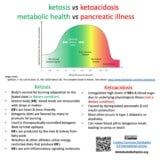Doris’s chronic schizophrenia remission brings hope

Did keto cure her schizophrenia?
Starting at the end, Doris ended up ok. Her ketogenic diet put her schizophrenia into remission. Remission is not a cure, but a state where the disease symptoms reverse. She lived happily ever after. But it wasn’t always so. She gave us permission to share her story of schizophrenia in remission for over a decade. Why? Doris wanted to further the understanding of her disorder and improve its treatment.
How it all began
Doris began her journey with mental illness at age 17. That’s when she was diagnosed with schizophrenia. This was in the 1950s. Not an illustrious era for psychiatry. Let’s look at some of the standard psychiatric care in the mid-twentieth century. Lobotomies, the surgical wiping out of swaths of brain, were being done to treat psychiatric symptoms. The cost was the patient’s personality. The first generation of antipsychotic drugs like Thorazine were beginning to be used. They dulled symptoms along with personality. These same types of drugs continued to be used until the 1990s. That’s when the second generation antipsychotic medications were developed. These dulled symptoms at the cost of metabolism. People may hallucinate less, but they’ll likely become obese and diabetic. All high prices to pay for an often marginal, or at best moderate, effect.
This psychiatric care, with first generation antipsychotics, was what Doris received during the first 2/3’s of her mental illness. Her medication brought her little respite and the relief came at a very high price indeed. She had multiple medical conditions and she was obese, weighing over 300 lbs. She was often suicidal, delusional, and paranoid, with both auditory and visual hallucinations. Her life was hell, both physically and mentally.
When hope appeared
Then she found Dr. Eric Westman at Duke University Medical Center (and Adapt your Life Academy). She went to him seeking relief from obesity. When she left, her life was more intact that it had been since her diagnosis more than half a century earlier.1(1) Dr. Westman and Doris thought they were helping her lose weight. They ended up improving her mental health as well.
When she started at Duke, Doris was on both antipsychotic and mood stabilizing medications. However, she was still very mentally ill. Her suicidal ideas, delusions, hallucinations, and paranoia persisted. She tried to kill herself multiple times. Doris desperately wanted to end her suffering, and death was the only hope she could see. She was an example of what can happen in psychiatry – symptoms can persist despite the best treatments, and the side effects can be significant.
The treatment
The doctors were treating Doris for weight loss. They put her on their standard protocol. A ketogenic diet limiting net carbohydrates to 20 grams per day. She ate mostly fat and protein. The doctors never measured to see the degree to which Doris was in ketosis. But they did note the significant weight loss that is suggestive of ketosis. Her total weight loss was 150 pounds over the course of years.
What happened to the psychosis?
But Doris was still mentally ill, right? The doctors did not make any changes to her psychiatric medications. We know they weren’t working anyway. Then something unexpected happened. As she lost weight Doris also stopped hallucinating. Her delusional thoughts stopped. She was able to pay attention to reality, something that her psychosis prevented her from doing for 50+ years. Out of the clouds of psychosis, she felt clear. Her schizophrenia was responding to the ketogenic diet in a way it didn’t respond to medications. She was improving. A lot.
Was her improvement sustained?
Over a decade later, the doctors published her case study (2019) and Doris was still slimmer and symptom-free. She no longer takes psychiatric medications to treat her schizophrenia. She no longer sees a psychiatrist. Her hallucinations, delusions, and paranoia have stopped. She is no longer obese. She is no longer suicidal. In fact, she says she’s happy to be alive! The ketogenic diet seems to have addressed both her obesity and her mental disorder.
Schizophrenia in remission – can that be? And what does it mean?
The ketogenic diet is known to be an effective intervention for another brain disorder, epilepsy. In Doris’s case, her brain disorder was schizophrenia and it too improved with a ketogenic diet. So what is the connection between these two brain disorders? How can a treatment for one also treat the other? Why would a metabolic intervention, a diet, help a mental disorder improve?
Well… it turns out that epilepsy treatments are already commonly used for psychiatric disorders. Things like Depakote, Lamictal, Topamax, Neurontin, Ativan, and Klonopin are all epilepsy medications that are also commonly used to treat psychiatric disorders. These connections between epilepsy and psychiatric disorders need to be researched more. The connections between brain disorders and metabolism need to be studied more. Examining these connections may further our understanding of schizophrenia and other mental disorders. The resultant increased understanding may illuminate a path to more effective treatments.
But in the meantime, there is hope – in Doris’s story, and in the ketogenic diet and the new insights about schizophrenia that it might provide.
Evidence schizophrenia isn’t a neurodegenerative disorder?
“Before I met this woman I was with most people and thought that schizophrenia was probably a neurodegenerative disorder.” Here in Chris Palmer’s own words at 1:23:55 on his podcast with Paul Saladino, MD.
Postscript – Schizophrenia remission?
The literature includes case series of 10 schizophrenic patients dating back to 1965. In each case the patient’s symptoms improved with the ketogenic diet and worsened when they stopped it. This article is based on one case explored by Chris Palmer, MD. He describes Doris in an article published April 6, 2019, in the medical journal Schizophrenia Research “The ketogenic diet and remission of psychotic symptoms in schizophrenia: Two case studies.”2(2) His review describes this case and another in more depth. In his article, he also proposes the ketogenic diet as a treatment in need of further study to replicate and validate the dramatic reduction in symptoms these patients experienced.
Dr. Palmer’s article revisited Doris’s case 12 years after Dr. Westman‘s original publication3(3)
More articles from Dr. Palmer on using therapeutic nutritional ketosis to put Schizophrenia into remission
You’ll find more information about Doris and a total of 6 case studies in “Chronic Schizophrenia Put Into Remission Without Medication – New research suggests ketogenic diet may play a role in treating schizophrenia.” More articles about the metabolic and mental health connection are on Chris Palmer, MD’s Psychology Today blog.4(4) Also, “Ketogenic Therapy for Brain and Mental Health” by Chris Palmer MD and Anne Rauch gives more details about Doris’s childhood and life.5(5)
These studies are important to the future of mental health care. They explain the potential use of a metabolic treatment, the ketogenic diet, for a difficult-to-successfully-treat disorder, schizophrenia. This treatment not only has the potential to be a potent and effective one, but one that also avoids the adverse effects of current treatments. Only further study will make clear the actual efficacy of the ketogenic diet in the treatment of schizophrenia. Optimizing outcomes brings hope.
Postcript on Doris and her schizophrenia remission
Our keto resources you might value
- Lifestyle Medicine, the key to metabolic healing
- Keto doctors near me
- How to build my ketogenic therapy treatment team
- Why write medical case reports about unique cases?
More on the connection between metabolic & brain health
- Relieving depression with the ketogenic diet?
- Might the ketogenic diet help fight Alzheimer’s Disease?
- Chris Palmer, MD’s Can a ketogenic diet successfully treat Bipolar Disorder?
- Doris’s chronic schizophrenia put into remission bringing hope to many
- Ketogenic diet helps Ecuadorian twins improve their schizophrenic symptoms
Success stories from the our team
- Metabolic Multipliers
- Captain Malagon
- Cecile’s
- Nurse Christie – My mother’s suffering spurred me to find keto
- Kraft B, Westman EC. Schizophrenia, gluten, and low-carbohydrate, ketogenic diets: A case report and review of the literature, Nutrition & Metabolism. 2009;6:10. [Google Scholar] [↩]
- Palmer C, Gilbert J, Westman E. “The Ketogenic Diet and Remission of Psychotic Symptoms in Schizophrenia: Two Case Studies.” Schizophrenia Research. 2019; April 6, 2019 [↩]
- Kraft B, Westman EC. Schizophrenia, gluten, and low-carbohydrate, ketogenic diets: A case report and review of the literature, Nutrition & Metabolism. 2009;6:10. [Google Scholar] [↩]
- Palmer C. “Chronic Schizophrenia Put Into Remission Without Medication – New research suggests ketogenic diet may play a role in treating schizophrenia.” Psychology Today. April 6, 2019. [↩]
- Palmer C, Rauch Anne, “Ketogenic Therapy for Brain and Mental Health.” Charlie Foundation for Ketogenic Therapies. 2019, April. [↩]











2 Responses
[…] Schizophrenia & Keto Diet […]
[…] Schizophrenia & Keto Diet […]